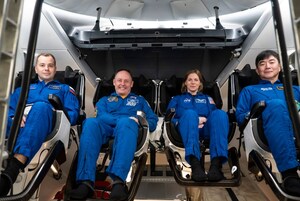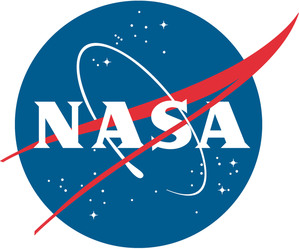
HOUSTON, Sept. 23, 2015 /PRNewswire-USNewswire/ -- NASA has selected five new flight directors to manage International Space Station (ISS) operations. Anthony Vareha, Mary Lawrence, Rick Henfling, Timothy Creamer and Vincent LaCourt join a select group of human space exploration leaders.
NASA's flight directors lead teams of flight controllers, research and engineering experts and support personnel around the world from within the Christopher C. Kraft Jr. Mission Control Center at NASA's Johnson Space Center (JSC) in Houston. They also are involved in space station cargo and crew vehicle integration and developing plans for future exploration missions.
"I am very proud to announce these new additions to our flight director team," said Brian Kelly, Flight Operations director. "There were many outstanding candidates who applied, which is a great indication of the tremendous talent we have supporting human spaceflight at the JSC Space Center and agency wide."
These newest five flight directors will oversee teams of human spaceflight engineers and experts carrying out current and future human exploration missions. They will oversee U.S. commercial cargo spacecraft and American Commercial Crew Program transports now under development as they arrive at and depart from the space station.
They will help ensure the crews of the orbiting laboratory have what they need to conduct scientific research providing real benefits to people on Earth and allowing NASA to be better prepared for long-duration exploration in deep space as it develops the Orion spacecraft and its Space Launch System (SLS).
These five also will protect and assist crew members as they demonstrate cutting-edge technologies aboard the space station that will help NASA and America on its journey to Mars and beyond.
"This group of new flight directors represent an amazing wealth of operational experience and demonstrated leadership," said Norm Knight, chief flight director. "The critical role of flight director cannot be understated and I could not be prouder to have them join our team."
Following completion of training and certification, NASA will have 27 active flight directors supporting the space station, exploration, commercial spaceflights and new technology demonstration initiatives. Before this newest selection, 86 people had served as NASA flight directors throughout the more than 50 years of human spaceflight.
The newly selected flight director class is:
Anthony Vareha
Vareha began his career at Kennedy Space Center, Florida, as a co-op student within the Solid Rocket Booster program office. Following graduation, he was assigned to JSC as a member of the ISS flight control team responsible for the thermal control system, and later the electrical power system. He gained extensive experience serving as a systems lead in various roles, including as thermal lead for Space Shuttle Endeavour's STS-134 mission in 2011, and electrical lead for ISS Expedition 29. Vareha served as electrical and thermal systems lead for three contingency spacewalks, which focused on the replacement of a faulty Main Bus Switching Unit, the repair of a battery cooling system and the isolation of a major leak in that cooling system, respectively. He has been team lead of several efforts, including the overhaul of solar array positioning constraints and the improvement of External Thermal Control System operations philosophies, all in an effort to maximize station operation. Vareha originally is from Monroeville, Pennsylvania (near Pittsburgh). He earned a bachelor's degree in engineering physics from Embry-Riddle Aeronautical University, Florida, and a master's degree in systems engineering from the University of Houston Clear Lake.
Mary Lawrence
Lawrence started her space career at JSC as a member of the International Space Station flight control team dedicated to operating the Command and Data Handling system. She served as the Command and Data Handling operations lead in various roles including ISS assembly and expedition missions. She went on to certify as a TITAN flight control officer supporting space station operations for the Motion Control, Communications and Tracking, and Command and Data Handling Systems. Lawrence was selected as the Environmental Control Instructor Group Lead in 2010 and was responsible for oversight of training for both the Environmental and Thermal Control Systems for Expedition flight crews and flight controllers. In 2012, Lawrence was selected to serve as the CRONUS Specialist Group Lead responsible for all operational, technical, and personnel aspects of the Command and Data Handling and Communications and Tracking Group. She originally is from Wattsburg, Pennsylvania, and earned a bachelor's degree in mechanical engineering from Pennsylvania State University at Erie, the Behrend College.
Rick Henfling
Henfling began his career at JSC as a flight controller in the Booster Systems Group, supporting space shuttle ascent and entry operations. He supported numerous space shuttle flights and was the lead Booster officer for STS-133. Henfling transitioned from shuttle to assist with requirements development for the Commercial Crew Program, where he evaluated commercial crew partner designs as part of the early development phases of the program (CDev-1, CCDev-2, and CCiCap). He also provided ascent and abort operations expertise in support of Orion/Space Launch System requirements and operations development. Henfling then was selected as the Flight Dynamics Division's technical assistant for the Exploration and Commercial Crew Programs, where his responsibilities included integrating the flight dynamics perspective/expertise into the Orion, SLS and Commercial Crew programs while keeping the division management team apprised of the latest issues and concerns. Most recently, he was the Flight Dynamics Division's technical assistant for Boeing CST-100 Starliner operations, where his duties included managing the Mission Planning and Analysis team's efforts in support of Boeing's Orbital Flight Test preparations. Henfling originally is from Cleveland, Ohio, and earned a bachelor's degree in mechanical engineering from the University of Dayton and a master's in mechanical engineering from the University of Houston.
Timothy J. "TJ" Creamer
Creamer began his career in the U.S. Army and brings a breadth of experience as a helicopter pilot, paratroop jumpmaster, and assistant professor of physics at West Point, where he served in leadership positions including an Attack Battalion Platoon leader and Air Calvary Troop commander. In these roles Creamer was lead for multiple real-time operational missions and personnel involved in the planning, training and execution aspects of each. He achieved the rank of colonel before retiring from the Army in 2011. While active in the Army, Creamer joined NASA in 1995 as a Vehicle Integration Test Office integration engineer, supporting numerous space shuttle flights and crews. Selected by NASA as an Army astronaut in June 1998, Creamer reported for astronaut candidate training in August 1998 and his technical duties focused primarily on the command and control computers of the ISS including those for the international partner modules. From December 2009 to June 2010, Creamer flew aboard ISS as the NASA Science Officer during Expeditions 22 and 23. Most recently, he served as a Payload Operations Director (POD) at the Marshall Space Flight Center, Huntsville, Alabama, for almost four years. During this time, Creamer completed the certification for the POD position, supported numerous payload activities including the planning, training, and mission execution thereof, and served as a liaison between Marshall and JSC. He currently is the Astronaut Office's prime representative for Orion landing and recovery. Creamer originally is from Upper Marlboro, Maryland, and earned a bachelor's degree in chemistry from Loyola of Baltimore, and a master's degree in Physics from the Massachusetts Institute of Technology.
Vincent LaCourt
LaCourt began his space career at the JSC Space Center as a member of the mechanisms and maintenance flight controller group. He gained certifications as an Operations Support Officer (OSO), Operations Support Officer Mechanisms (OSO MECH), and Repair and Mechanisms (RAM) instructor. LaCourt supported numerous space shuttle flights and ISS Increments, including serving as lead for Increment 18, Flight 1JA and Japanese H-II Transfer Vehicle (HTV-3) mission. He also led OSO Team 4 during the STS-120 P6 Solar Array repair. LaCourt then moved to the role of Program Integration Engineer within the Flight Director Office, where his responsibilities included integrating technical/operational positions and presenting those positions to the ISS and Commercial Crew Program (CCP). Prior to selection as a flight director, he was chief engineer of the Commercial Crew Branch within the Astronaut Office, managing technical and programmatic issues with CCP and its commercial partners (Boeing and Space X). LaCourt originally is from Alief, Texas, and earned a bachelor's degree in aerospace engineering from the University of Texas at Austin.
For information about the International Space Station, visit:
http://www.nasa.gov/station
Logo - http://photos.prnewswire.com/prnh/20081007/38461LOGO
SOURCE NASA






Share this article